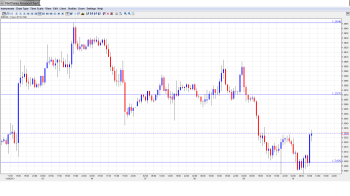After taking a tumble on Wednesday, the euro is holding steady against the US dollar. EUR/USD remains under pressure, as the pair trades slightly above the 1.35 line. The spotlight was on the Federal Reserve on Wednesday, as President Obama nominated Janet Yellen to head the Federal Reserve. As well, the FOMC Meeting minutes indicated that most policymakers favor tapering QE before the end of the year. In economic news, French and Italian Industrial Production came in well below their estimates. Today’s highlight is US Unemployment Claims.
Here is a quick update on the technical situation, indicators, and market sentiment that moves euro/dollar.
EUR/USD Technical
- In the Asian session, EUR/USD lost ground, dropping below the 1.35 late in the session and touching a low of 1.3488. The pair has crossed back above the 1.35 line in the European session.
- Current range: 1.3500 to 1.3570.
Further levels in both directions:
- Below: 1.3500, 1.3460, 1.3415, 1.3325, 1.3240, 1.3175, 1.31, 1.3050 and 1.3000.
- Above: 1.3570, 1.3650, 1.3710, 1.3800, 1.3870 and 1.3940.
- 1.3500 is providing weak support. 1.3460 follows.
- 1.3570 is the next resistance line.
EUR/USD Fundamentals
- 6:45 French Industrial Production. Exp. 0.7%, Actual 0.7%.
- 8:00 ECB Monthly Bulletin.
- 8:00 Italian Industrial Production. Exp. 0.6%, Actual -0.3%.
- 12:30 US Unemployment Claims. Exp. 307K.
- 13:45 US FOMC Member James Bullard Speaks.
- 14:30 US Natural Gas Storage. Exp. 96B.
- 16:20 ECB President Mario Draghi Speaks.
- 17:01 US 30-year Bond Auction.
- 16:45 US FOMC Member Daniel Tarullo Speaks.
* All times are GMT.
For more events and lines, see the Euro to dollar forecast.
EUR/USD Sentiment
- Dollar Up as Yellen nominated for Fed head: The dollar was broadly higher on Wednesday, as President Obama nominated Susan Yellen to replace Bernard Bernanke as chairman of the Federal Reserve. Bernanke is due to retire early next year, and Yellen, who serves as Fed vice-chairwoman, became the leading candidate after former Treasury Secretary Lawrence Summers withdrew his candidacy. Yellen is considered dovish in stance and has supported Bernanke in three rounds of QE increases. Yellen’s nomination must be confirmed by the Senate, but this is expected to be little more than a formality.
- FOMC minutes point to QE tapering: The minutes of the September Fed policy meeting were released on Wednesday. At that meeting, the Fed surprised the markets by not reducing its bond-purchasing program, which currently runs at $85 billion/mth. The minutes said that the decision not to begin tapering was a “close call”. This has raised speculation that we could see tapering before the end of the year. However, the monkey wrench in all this is the fiscal uncertainty from shutdown and looming debt crisis. As well, the Fed is heavily dependent on key releases such as Non-Farm Payrolls, which have been suspended to the shutdown. So it’s unlikely that we’ll see any moves to reduce QE prior to December.
- Shutdown drags on: The US shutdown has now entered its second week, and the Republicans and Democrats continue to play the blame game. Neither side is showing any flexibility, at least in front of the cameras. Polls show that most of the public blames the Republicans for the impasse, and this is likely increasing the pressure on the Republicans to agree to pass the budget so that the government can resume operating. The economic damage from the shutdown is not expected to be substantial, but the political fallout of this crisis will likely be significant.
- Debt ceiling countdown: As if Congress doesn’t have its hands full with the budget deadlock and shutdown, the debt ceiling is very close and could unleash a devastating crisis. The US has a debt worth $16.7 trillion, and the country will run out of funds to service the debt by October 17, unless Congress authorizes raising the debt ceiling. Otherwise, the US could potentially default on its obligations, which could cause chaos in the domestic and international markets. There is a lot of bad blood between the Republicans and Democrats over the shutdown, and this will undoubtedly complicate negotiations over the debt ceiling. Talks between the sides are focusing on the possibility of a short-term increase in the debt limit, which would avoid a default, for now.

